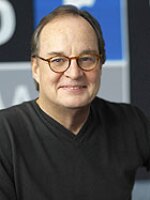ALEX CHADWICK, host:
From the studios of NPR West, this is Day to Day. Madeleine Brand is away, I'm Alex Chadwick.
(Soundbite of ceremony)
CHADWICK: Ceremonies today at the Tomb of the Unknowns at Arlington National Cemetery where President Bush laid a wreath for Memorial Day. Coming up on the program a Green Beret officer remembers a friend lost in the line of duty. First, the Democrats' final primaries come Sunday in Puerto Rico, and next week in Montana and South Dakota. But on Saturday in Washington there's an event to determine the primary results in two of the most popular states. NPR senior Washington editor Ron Elving is with us. Ron, it's Florida and Michigan. Explain.
RON ELVING: One more time to Florida and Michigan. You know the voters did decide in a way back in January when these states held their primaries outside the calendar window allowed by the national party. They were kind of awkward primaries. The candidates didn't campaign there. Barack Obama wasn't even on the ballot in Michigan. And no one was sure whether any of this was going to count because the party's rules had said that they wouldn't count any delegates at all who were chosen before the calendar window began on February 5th.
CHADWICK: So now where are we with this very confused process?
ELVING: Well one big thing has changed, and that is that what the time that they work this all out in fall and winter last year there was an assumption that February fifth would kind of be Super Tuesday, they would have a nominee. It would be clear, and then they could go back and repair the damage between the national party and Florida and Michigan. But of course instead we had months, and months, and months primary after primary, after primary, and caucuses. And we haven't known who the nominee was going to be so and so there hasn't been any kind of basis on which everyone could get together. Now that we're getting a little closer to the end, and Barack Obama has more or less dominating lead of about 200 delegates overall, it looks possible that people can actually get together, and work out some kind of a deal.
CHADWICK: But Senator Clinton, in particular, is holding on to Florida and Michigan as maybe a path for her, and she says this is important and we have to get these two states in there.
ELVING: That's right, and there is a meeting of the rules and bylaws committee of the Democratic National Committee this weekend in Washington at the Mayflower hotel. They're going to try to come up with some kind of a compromise that would get these delegations seated, and which will almost by force because Hillary Clinton won both those state primaries, give her a payoff in delegates. Now they can stick to the rules and exclude both states totally, but that would hurt the party too much in both states and probably hurt the nominee, and cost him a chance to win those states. They could also totally just bring the prodigals back in, and welcome them, and say no penalty at all, but of course that would send a bad message to all the other states that did follow the rules. So they're looking for a compromise.
CHADWICK: And that is?
ELVING: Probably something along the lines of what we call the 50 percent solution. This is what the Republicans are doing. They're punishing the same two states by cutting their delegations in half. Then they can send half as many people if they like or they can send the same number of people, and give each one of them half a vote. So in the Democrats' case in Michigan they would go from having 28 pledge delegate votes to having 64. But they can have 128 people go, and just each cast half a vote.
CHADWICK: So how is that good for Senator Obama?
ELVING: It's good because while he does give up maybe 10 in Michigan maybe 20 or so in Florida, if they cut that in half especially it really doesn't matter that much to his overall lead. It doesn't cut it down enough and it's not too great a price to pay for peace in the valley.
CHADWICK: Aah. Ron, I see the light! NPR senior Washington editor Ron Elving. Thank you again.
ELVING: Thank you Alex. Transcript provided by NPR, Copyright NPR.







